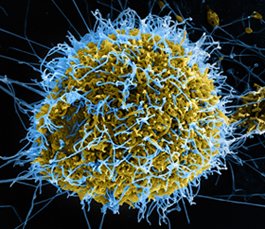Ebola crisis - Reading virologists provide expert analysis
Release Date 07 August 2014

During the outbreak of Ebola in West Africa, University of Reading virologistsProfessor Ian Jones and Dr Ben Neuman have been providing expert analysis for national and international media. From speaking to CNN and BBC News Online, to appearing on BBC Radio Five (01:22mins in) and Good Morning Britain, their insight has helped journalists report the facts accurately and clearly.
Below, Dr Neuman explains what Ebola is and why the virus is not a threat to the UK.
What is Ebola?
Ebola is a virus that causes a potentially lethal illness called hemorrhagic fever. This makes the body's blood vessels porous and they start to leak, causing catastrophic internal bleeding. Up to nine out of ten people who contract the virus will die without immediate medical attention. The virus emerged in 1976 in an isolated village near the Ebola river in the Democratic Republic of Congo.
How is Ebola transmitted?
Researchers believe that the natural hosts of Ebola virus are fruit bats, and that the virus is transmitted to non-human primates and then to humans through the bush meat trade.
The virus can spread person to person but requires direct contact with the body fluids of an infected individual or corpse. This virus is not transmitted by the respiratory route - you cannot catch Ebola as you would the flu.
While it is possible in theory to transmit Ebola fever sexually, usually the virus is spread to family members and hospital staff who tend the sick. The other common route for infection is at public open casket funerals of Ebola victims.
Should we be worried?
There is a possibility of Ebola coming to UK - but it's very unlikely. The virus remains very weak, fragile, and transmits very inefficiently. Ebola is spreading in West Africa among a mostly rural population due to a lack of trust and education about medical intervention - that does not exist in the UK.
We also have a massive infrastructure in place to prevent diseases like Ebola from coming to Britain - highly trained people, equipment and technology that will be mobilised if a case arrives. One reason that we haven't heard more about similar diseases in the past is because our public health workers are good at their jobs. There is virtually no risk to the general population.
What effect will the WHO's declaration of a Public Health Emergency of International Concern have?
The WHO declaring a public health emergency of international concern is a big forward step in the fight against this dangerous disease. It is a rare event, something only done in the past for H1N1 "swine" flu in 2008 and the ongoing polio outbreak.
This will make the vast resources of the United Nations such as funds, experts and equipment, available to help stop Ebola. This should bring the outbreak under control although it's likely it won't be stopped completely until after Christmas.
The WHO also recommended common sense procedures to stop the spread of infection, such as taking temperatures of incoming passengers from airports in the affected region.
Will we ever combat Ebola?
Educating and gaining the trust of the people likely to be infected are key to preventing future outbreaks. Pharmaceutical companies are businesses - they last only as long as they continue to make money. While a new wonder drug may be hugely profitable in the short-term, the financial health of a company depends on its drug development pipeline, the ability to bring a steady flow of new drugs to the market in the long term. And a company is only as strong as its pipeline.
The potential Ebola medications that are being considered all work well at stopping the virus in the lab and in infected animals. A person with Ebola might have to be treated for a month or more, and the side effects of large amounts of treatment over a long time are tough to predict.
There are reasonably strong humanitarian and ethical grounds to allow experimental Ebola therapies for infected people. However the scientific case for treatment is murkier unless the treatments can be done in a careful, controlled way.
